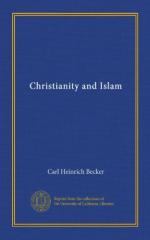A similar affinity is apparent as regards ideas upon social position and occupation. Before God man is but a slave: even the mighty Caliphs themselves, even those who were stigmatised by posterity as secular monarchs, included in their official titles the designation, “slave of God.” This theory was carried out into the smallest details of life, even into those which modern observers would consider as unconcerned with religion. Thus at meals the Muslim was not allowed to recline at table, an ancient custom which the upper classes had followed for centuries: he must sit, “as a slave,” according to the letter of the law. All are alike slaves, for the reason that they are believers: hence the humiliation of those whom chance has exalted is thought desirable. This idealism is undoubtedly more deeply rooted in the popular consciousness of the East than of the West. In the East great social distinctions occur; but while religion recognises them, it forbids insistence upon them.
As especially distinctive of social work in either religion we might be inclined to regard the unparalleled extent of organizations for the care of the poor, for widows and orphans, for the old, infirm and sick, the public hospitals and almshouses and religious foundations in the widest sense of the term; but the object of these activities was not primarily social nor were they undertaken to make life easier for the poor: religious selfishness was the leading motive, the desire to purify self by good works and to secure the right to pre-eminence in heaven. “For the salvation of my soul and for everlasting reward” is the formula of many a Christian foundation deed. Very similar expressions of hope for eternal reward occur in Muhammedan deeds of gift. A foundation inscription on a mosque, published by E. Littmann, is stated in terms the purport of which is unmistakable. “This has been built by N or M: may a house be built for him in Paradise (in return).” Here again, the idea of the house in Paradise is borrowed from Christian ideas.
We have already observed that in Islam the smallest trivialities of daily life become matters of religious import. The fact is especially apparent in a wide department of personal conduct. Islam certainly went to further extremes than Christianity in this matter, but these customs are clearly only further developments of Christian regulations. The call to simplicity of food and dress has already been mentioned. But even the simplest food was never to be taken before thanks had been given to God: grace was never to be omitted either before or after meals. Divine ordinances also regulated the manner of eating. The prophet said, “With one finger the devils eat, with two the Titans of antiquity and with three fingers the prophets.” The application of the saying is obvious. Similar sayings prescribe the mode of handling dishes and behaviour at a common meal, if the blessing of God is to be secured. There seems to be a Christian touch in one of these




